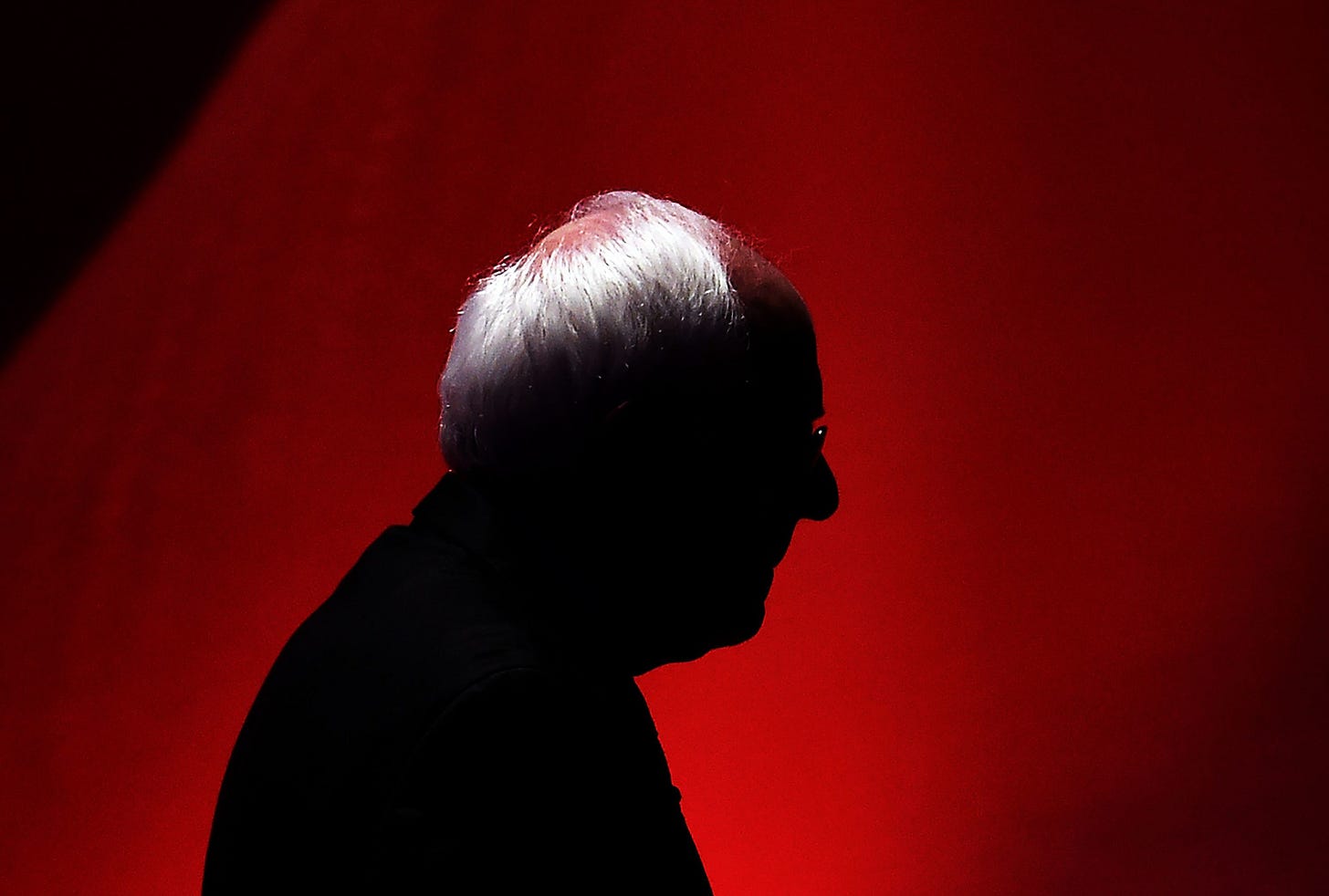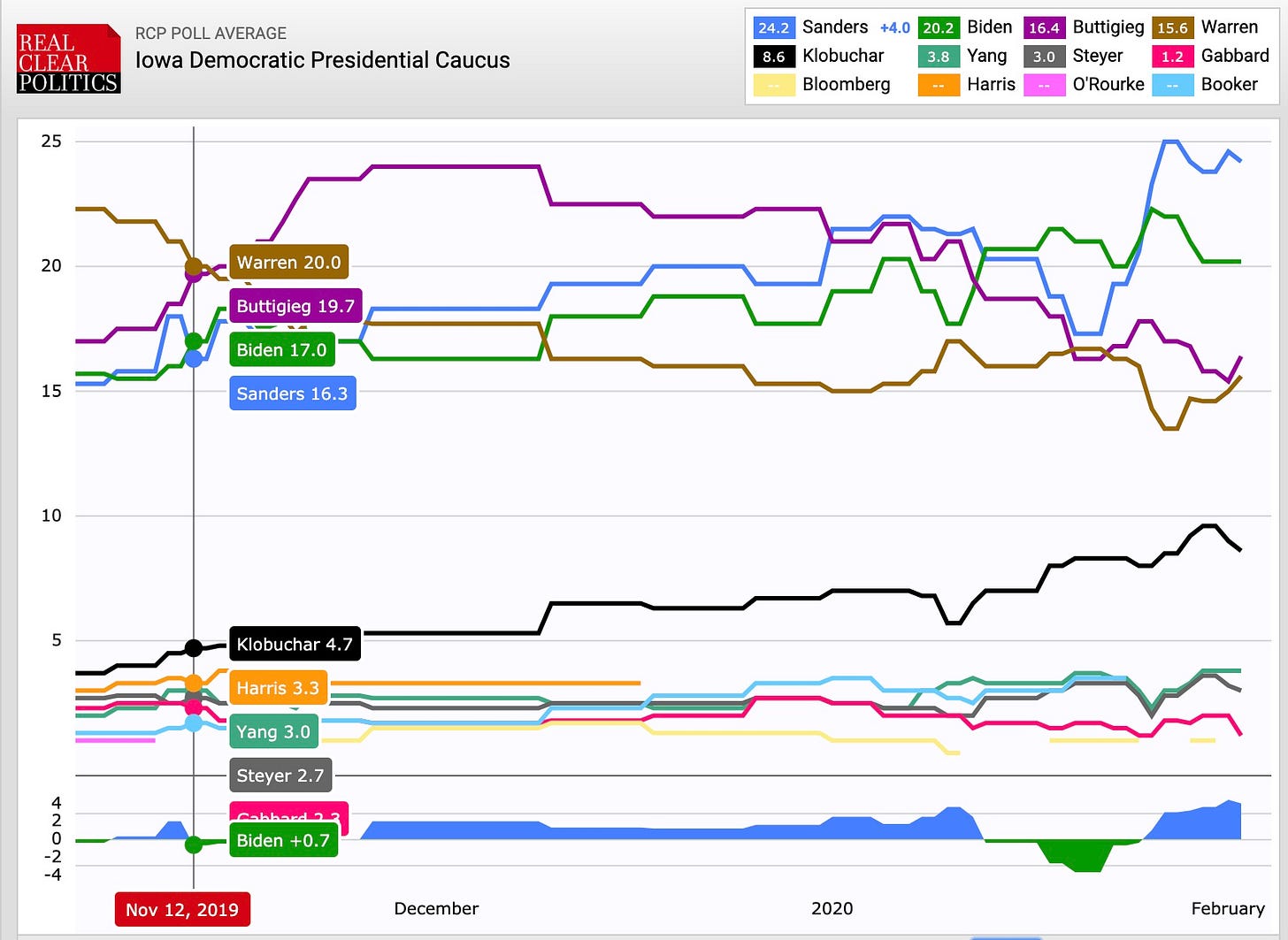Iowa’s Inverse Heisenberg Problem
Don't overinterpret the results just because they finally exist.

There’s this weird thing that happens in politics—kind of like a mirror-image of the Heisenberg uncertainty principle—where the fact of something happening changes our measurement of what it means.
For instance, you can spend months thinking that an election result is going to occur—but then, when it actually comes to pass—people freak out and act like something new and earth-shattering has taken place.
For instance: You could see the midterm results in 2018, 2014, 2010, and 2006 coming from a mile away. Then, in the days after the election, people were shocked!
Holy crap! This thing we’ve been watching in slow motion for months actually happened!
And it looks like we’re about to do that in Iowa, too.
Here is the state of play in Iowa: Bernie Sanders is likely to win. Joe Biden is likely to come in second. They are likely to finish with support in the mid-to-high 20s, though their order of finish could conceivably be switched.
The next tranche of finishers is likely to be Elizabeth Warren and Pete Buttigieg, with support in the mid-teens. It is possible that Amy Klobochar will get to the mid-teens, but unlikely.
If the results track this way, then it will basically mean for the candidates what we always thought it would mean for the candidates. There were always going to be three candidates for whom winning Iowa was a necessary-but-not-sufficient step, and one candidate whose support was structured to withstand a loss.
Let’s go back to what we’ve known all along:
Bernie Sanders has to win Iowa. He has been a strong, but persistently second-place, candidate nationally for almost a year. His theory of the nomination is this: He wins Iowa, pockets a favorite-son victory in New Hampshire, and then digs in for a months-long delegate fight against Biden.
Bernie’s hope is that the collective weight of the progressive coalition in the party is now sizable enough to beat the moderate coalition over the long-haul and that, in a one-on-one fight with Biden, he can eke out a slim delegate majority.
As such, anything that wounds Biden is good. From Sanders’s point of view, the best outcome would be a a double-digit victory, with Buttigieg, Warren, and Biden in a muddle (ideally with Biden in the fourth spot).
Go back three months and this looked like a live possibility, with Biden sitting consistently in either third or fourth place.

So is Bernie winning Iowa helpful to him? Absolutely! Does it signal that the race has somehow changed? Not really.
Elizabeth Warren and Pete Buttigieg also have to win Iowa. If one of them finishes a strong second, that might be enough to slingshot into a New Hampshire fight with Bernie.
But if they finish three/four—especially a weaker three/four—then their campaigns go into terminal decline. The race will be set as a stark ideological choice between Sanders and Biden and the voters who support Warren and Buttigieg will bleed away to join that central conflict.
Joe Biden is the only candidate built to lose Iowa. For months it was clear that Biden could lose Iowa and New Hampshire—maybe even finish fourth!—and still manage to emerge as the nominee.
Note that this was not a certainty: It’s hard to lose the first two contests and then win the nomination. But it can happen.
Bill Clinton lost the first four contests in 1992. Clinton only won 1 of the first 11 races! And yet, he was the favorite the entire way because his coalition was designed for the long haul. Once the race moved south to an electorate with a higher proportion of African-American voters, Clinton dominated. (Never forget that the Clinton campaign dubbed him the “comeback kid” because he only lost New Hampshire to Paul Tsongas by 9 points.)
Funnily enough, it’s a sign of Biden’s strength as a candidate that he even has a chance to win Iowa. The state is a bad fit for him, but instead of skipping it, he’s played there, hard. In Biden’s best-case scenario, he’d get a surprise win in Iowa, short-circuiting the entire process. This would allow him to focus on consolidating the Warren-Sanders vote and unifying the party without having to fear for the nomination.
The next best-case scenario for Biden was him facing off one-on-one against Bernie.
A one-on-one fight against Warren or Buttigieg would have been more dangerous for Biden. Warren because she has a greater connection to the party regulars who make up part of his coalition. Buttigieg because his strengths contrast with Biden’s weaknesses.
But if Biden finishes second, he gets the fight he wants against the opponent he wants: A democratic-socialist with only pro forma ties to the party who is wildly out of step with the electorate and a significant general-election risk.
The danger for Biden was always finishing a distant fourth (which, again, was a possibility just a couple months ago) and then having to face a progressive front united behind Elizabeth Warren.
If he gets out of Iowa avoiding that scenario, he’ll have done well.
If the caucus plays to form and we get Bernie first and Biden second, then both candidates will have gotten what they wanted. And the race becomes a defined contest for what the Democratic party wants to be.
The outcome of this fight isn’t foreordained, but if you go by all the traditional markers, you have to like Biden’s chances.


